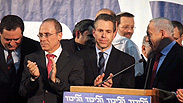
'Today's Likud is lacking new, young, charismatic forces, as well as a wide variety of opinions'
צילום: מוטי קמחי
Where has Likud's liberalism gone?
Op-ed: When Likud loses its ability to present itself as a liberal and pragmatic right-wing party, it loses its ability to govern, resulting in shaky coalitions.
Theoretically, the Likud is the biggest party in Israel: A huge number of members, party systems, a glorious tradition and financial assets.

Theoretically, the Likud is the party with the biggest voter potential in Israel. Apart from ideological leftists, everyone can feel at home there: Rightists and centrists, socialist activists and capitalist businesspeople, religious Jews and secular Jews, conservatives and liberals.
Theoretically, the Likud is Ze'ev Jabotinsky and Menachem Begin – the man who spoke about nationality with no compromises, but compromised in almost every way he took as prime minister.
Theoretically, the Likud is the only party capable of bringing peace, fighting in a short and sweet manner, and dealing with the diplomatic challenge without getting caught in illusions about a new Middle East.
Theoretically, if Mapai is a party of entrepreneurs who built a villa in the jungle, the Likud is a party of the levelheaded landlords who should have sustained their party vis-à-vis the hardships of the past years and the strong winds.
Theoretically, the Likud's rule would have been secured right now, but in practice it is fighting for its existence, lacking a platform and insights on how to attract the Israelis.
Large ships sink slowly. Sometimes the passengers onboard don't even know there's a problem. Sometimes a minor collision creates a small hole and the water arrives by itself.

Netanyahu at a Likud event. 'All alone, standing helpless in the face of the large groups which have taken over the party'
On Wednesday, Likud members will vote in the primary elections. The party's list of candidates for the Knesset will be revealed by the end of the week.
The list is a reflection of the party. Large power groups, religious Israelis living in Judea and Samaria favored over secular Israelis living in the other parts of the country. Weary conservatism favored over liberalism. Old favored over new.
The list will be convenient for the large power groups, but not for the voters. It won't have any interesting faces or new opinions, and it mainly won't have the excitement and enthusiasm which should bring voters like me back home.
Today's Likud is lacking new, young, charismatic forces, as well as a wide variety of opinions. Prime Minister Benjamin Netanyahu, who understands that very well, is all alone. He stands helpless in the face of the large groups which have taken over the party.
He is trying to speak their language, appeal to them, attack the leftists a bit, like Knesset Member Miri Regev. But at the end of the day, when he steps down from the podium, the prime minister looks to the right and to left and discovers that he has been left all alone.
The Likud's major advantage since the Begin era was its liberalism. National or religious parties were always at the Likud's side, representing sectors and opinions. There was only one party which was capable of creating a link between proud nationalism and liberalism. A mixture of the Jabotinsky legacy and a modern Israeli discourse. A link between the Greater Land of Israel camp and the Liberal Party under one roof. That mixture no longer exists.
In the past few years, I have met several groups which are trying to change the Likud. Young liberals like the new Likudniks who are trying to get people to join the movement. They have tried to become a center of power which would determine who would be elected to the Knesset – what would be the party's nature – but were unsuccessful.
On regular days, the Likud's leaders have no time for them because they are not important enough; during elections they are not important enough because they don't have enough members.
Their main problem is the lack of leaders who can attract voters, charismatic magnets like Moshe Feiglin for the religious members from Judea and Samaria. Their disadvantage is also the Likud's disadvantage in the upcoming elections.
In this reality, the Bayit Yehudi and centrist parties are expected to take votes from the Likud. The Bayit Yehudi list is younger and more vibrant. Alongside the Tkuma faction, which they will try to hide, there are some interesting voices there.
The centrist parties, on the other hand, will offer moderation, and mainly an alternative to an empty ballot for right-wing voters.
Whoever thinks this is an internal party issue is wrong. When the Likud loses the ability to present itself as a liberal and pragmatic right-wing party, it loses its ability to govern. The ability to attract the main mass of votes in the center.
This is how we get coalition compositions with an almost inexistent ability to survive and make decisions. This is how we reach new elections not so long after the previous elections.










